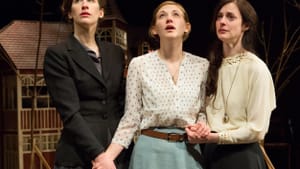Stay in the Loop
BSR publishes on a weekly schedule, with an email newsletter every Wednesday and Thursday morning. There’s no paywall, and subscribing is always free.
A leisurely entry into a leisurely world
'Three Sisters' at the Arden (2nd review)

For modern audiences, one of the worst things about Three Sisters is that it’s long — close to three hours. One the best things about it is that it's long — a leisurely and richly developed tale of relationships.
Three Sisters was written at a time when there was no television, radio, movies (yes, they’d been invented, but were short and silent), or cell phones. It was an era when audience members removed themselves from the outside world and immersed themselves in other people’s stories. And Chekhov explored family dynamics and feelings as no playwright had done before.
Terrence Nolen’s production adds an opening scene that makes the running time even longer, and that’s fine. (He does recognize modern schedules by presenting the four acts with only one intermission instead of three.) The play has 14 characters, most of them with long Russian names, and first-time attendees might have trouble learning who is whom. Therefore, to help us enter their lives, Nolen starts with a bare rehearsal room and has one of the characters introduce her fellow actors to the world of Chekhov. Each person is identified and described as they read their first lines while seated at long tables. A video camera magnifies the actors in close-ups. Thus, the audience is engaged in the process.
Gradually, each actor assumes the role he or she is assigned. They move those tables to create elementary sets. As the action proceeds the sets become more realistic. As the action involves deeper issues with greater consequences, the production becomes larger.
It is simplistic to describe Chekhov as melancholy or apathetic, as many have labeled him. His characters do have fears, and they complain that their lives are dreary and unhappy. I’d say this is realism. Stuck in a provincial town and surrounded by military, the titular sisters are discontented with their existence. The sisters yearn to go to Moscow to live the life of their dreams. We see that the point of the play is how to survive pain and go on.
We must accept that there are no big events in the play. Rather, we see an accumulation of small decisions that affect everyone’s feelings. A substantial amount of time passes as, for example, we meet brother Andre’s fiancée, Natasha, and see her become first a wife and then the tyrannical mistress of the estate. Such progressions should not be rushed.
In the middle of the second half, as Act 3 gives way to Act 4, we see a coup d’théâtre. The scene changes from inside a claustrophobic bedroom into a bigger space, an exterior with surrounding autumnal trees in the foreground and the house in the background. The walls of the bedroom dissolve, a metaphor for the insular world, the room-light fixtures rise and disappear, and we see a vision of the world where each sister hopes to live a happier life.
Mood is established and diversions are provided by having characters sing and dance, mostly Russian songs of that era. Some of the music is more modern and not Russian, which will be controversial for some observers, but I presume it’s to indicate the universality of the story. Columbus’s new translation is uncluttered and faithful to the original text.
Sarah Sanford as Olga, Mary Tuomanen as Irina, and Katharine Powell as Masha are vividly characterized, as is Rebecca Gibel as their sister-in-law. Scott Greer is a haunting presence as the army doctor Chebutykin. Traditional productions make him 60 years of age. Here, no age is spoken, and we readily accept that even a man in his 40s can be a burnt-out alcoholic. In fact, he is an even more pathetic figure because of this. Luigi Sottile is the hapless gambler Andre, James Ijames is a dashing Baron Tuzenbach, and Ian Merrill Peakes an idealistic Colonel Vershinin, who becomes involved with the unhappily married Masha. Louis Lippa and Cathy Simpson are the sympathetic old servant and nurse.
Eugene Lee is a Broadway designer of great reputation, and here he created uncharacteristicly simple, but intricate, sets.
For Naomi Orwin's Three Sisters review, click here.
For Steve Cohen's review of Durang's Vanya and Sonia and Masha and Spike, click here.
What, When, Where
Three Sisters. By Anton Chekhov. New translation by Curt Columbus; Terrence J. Nolen directed. Arden Theatre Company production through April 20, 2014, at Arden Theatre’s F. Otto Haas Stage, 40 N. Second St., Philadelphia. 215-922-1122 or www.ardentheatre.org.
Sign up for our newsletter
All of the week's new articles, all in one place. Sign up for the free weekly BSR newsletters, and don't miss a conversation.

 Steve Cohen
Steve Cohen